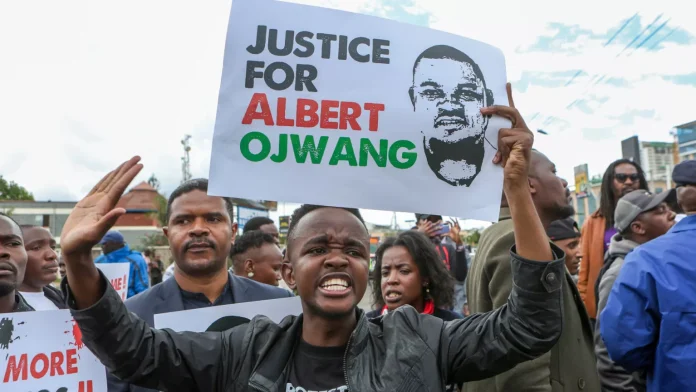Albert Ojwang, a 31-year-old teacher and popular political blogger, has become a symbol of resistance and national grief in Kenya following his tragic death in police custody. But before the country erupted in protests and the international community demanded answers, questions lingered around one central issue, what led to his arrest?
According to police reports and statements from family and legal representatives, Albert Ojwang was arrested on June 6, 2025, in Homa Bay County. The alleged offense? Publishing “defamatory content” on his personal blog and social media platforms targeting top-ranking police officials, including Deputy Inspector General of Police Eliud Lagat.
Ojwang had long been known for his fearless criticism of corruption within Kenya’s security forces. His posts often called out senior officers by name, demanding accountability for extrajudicial killings, misuse of power, and government inaction. In the days leading up to his arrest, Ojwang reportedly published a viral exposé accusing certain high-ranking police officials of facilitating cover-ups in a series of unsolved killings in western Kenya.
The blog post in question, titled “Uniforms of Impunity: Who Really Runs Kenya’s Police?”, went viral and sparked heated debate online. In it, Ojwang implicated unnamed officers in “state-sanctioned terror against citizens” and demanded investigations into disappearances of young activists and street vendors in Kisumu and Homa Bay.
While his accusations were bold, many saw them as a continuation of his long-standing mission to hold the powerful to account. Human rights lawyers have stated that the charges of “defamation of public officials” violate Kenya’s 2010 Constitution, which guarantees freedom of expression and the press.
“When Albert was arrested, we were told it was a standard cybercrime investigation,” said his lawyer, Lydia Omondi. “But the fact that he was whisked away from Homa Bay to Nairobi overnight, without legal representation, raises serious red flags. They weren’t trying to prosecute him—they were trying to silence him.”
Upon arrival in Nairobi’s Central Police Station, Ojwang was allegedly denied access to both legal counsel and family members. By June 8, he was found unconscious in his cell and pronounced dead at Mbagathi Hospital shortly after.
An autopsy has since revealed signs of physical assault, including blunt force trauma to the head and signs of neck compression—evidence that contradicts initial police statements suggesting he harmed himself.
In the days following his death, Kenya has been rocked by protests calling for justice—not just for Albert Ojwang, but for all victims of police brutality. His name has become a rallying cry in the streets: “Albert spoke for us. Now we speak for him.”
As investigations continue and international pressure mounts, the focus now turns not just to the officers involved, but to the broader system that allowed such an arrest—and such a death—to occur.


